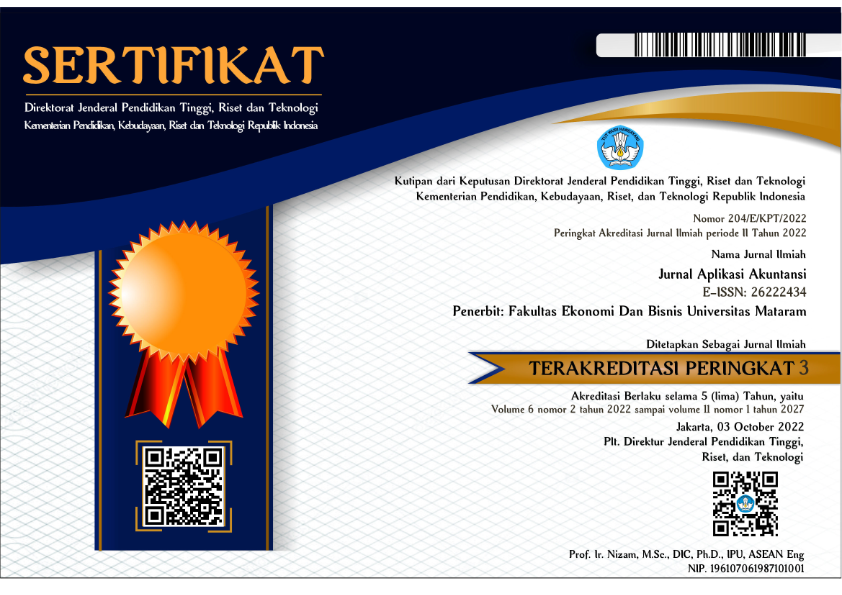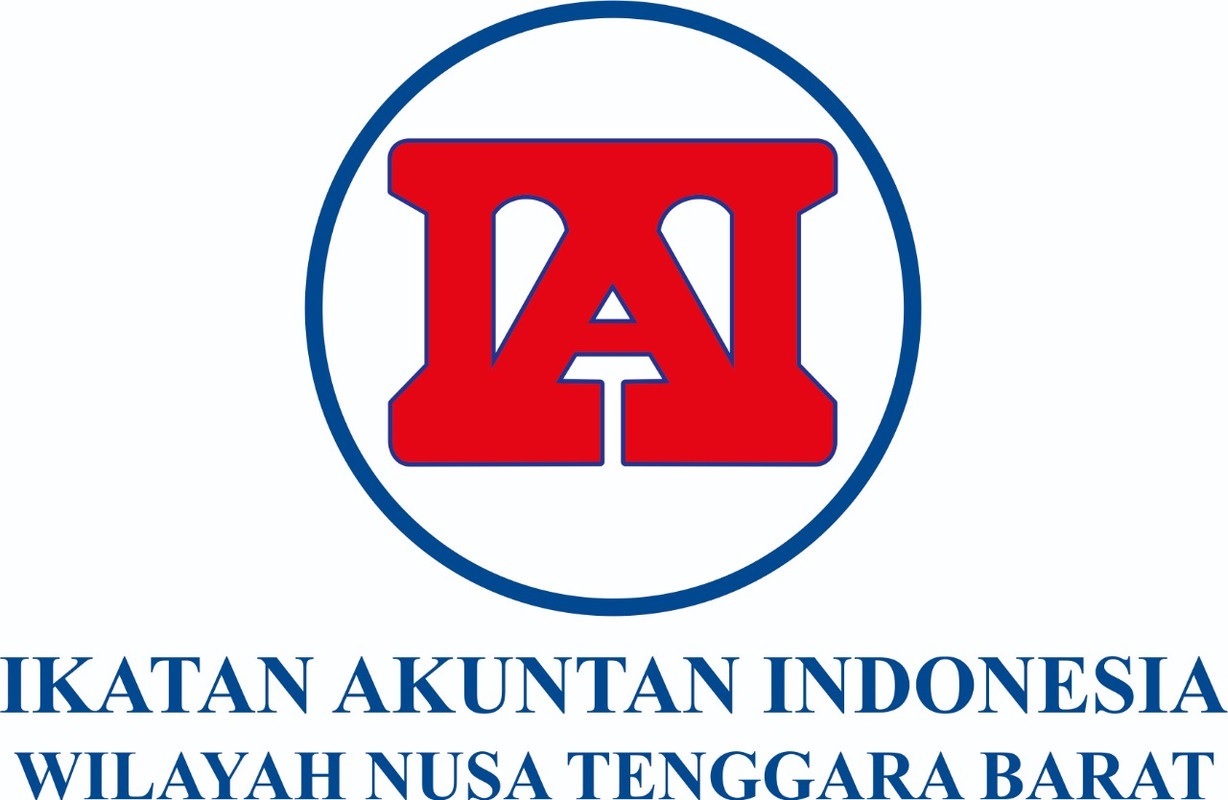POTENSI FOOD LOSS DAN FOOD WASTE PADA UMKM: MFCA, NUDGING DAN NEUTRALIZATION THEORY
DOI:
https://doi.org/10.29303/jaa.v7i2.187Keywords:
Food, loss, waste, mfca, nudging, neutralizationAbstract
This research analyzes the food loss and food waste phenomenon at Warung Tegal in Bekasi City where food loss and food waste dominate in landfill resulted in overload capacity. Warteg did not know about food loss and food waste ‘s potential, so it was ignored. The analysis was carried out to calculate the potential for food loss and food waste generation using material flow cost accounting (MFCA) from 6 Warteg units and using neutralization and nudge theory to see the behavior of Warung Tegal in management. Case study research strategy with observation and interview research instruments using primary data. The results showed that Warteg A produced a FLW of 10.57%, equivalent to Rp. 568,855. Warteg has not carried out optimal management of neutralization through 3 (three) neutralization techniques: denial of responsibility, denial of injury, and appear to higher loyalty. Warteg minimally mitigates food loss and food waste through nugding carried out upstream and downstream.
References
Arikunto, S. (2011). Prosedur penelitian : suatu pendekatan praktik. Rineka Cipta.
Betz, A., Buchli, J., Göbel, C., & Müller, C. (2015). Food waste in the Swiss food service industry - Magnitude and potential for reduction. Waste Management, 35, 218–226. https://doi.org/10.1016/j.wasman.2014.09.015
Christ, K. L., & Burritt, R. (2017). Material flow cost accounting for food waste in the restaurant industry. British Food Journal, 119(3), 600–612. https://doi.org/10.1108/BFJ-07-2016-0318
Christ, K. L., & Burritt, R. L. (2015). Material flow cost accounting: A review and agenda for future research. Journal of Cleaner Production, 108, 1378–1389. https://doi.org/10.1016/j.jclepro.2014.09.005
FAO. (2019). The State of Food and Agriculture 2019. Moving forward on food loss and waste reduction.
Filimonau, V., Coşkun, A., Derqui, B., & Matute, J. (2022). Restaurant management and food waste reduction: factors affecting attitudes and intentions in restaurants of Spain. International Journal of Contemporary Hospitality Management, 34(3), 1177–1203. https://doi.org/10.1108/IJCHM-07-2021-0899/FULL/PDF
Filimonau, V., Matute, J., Kubal-Czerwińska, M., Krzesiwo, K., & Mika, M. (2020). The determinants of consumer engagement in restaurant food waste mitigation in Poland: An exploratory study. Journal of Cleaner Production, 247, 119105. https://doi.org/10.1016/J.JCLEPRO.2019.119105
Filimonau, V., Zhang, H., & Wang, L. en. (2020). Food waste management in Shanghai full-service restaurants: A senior managers’ perspective. Journal of Cleaner Production, 258, 120975. https://doi.org/10.1016/J.JCLEPRO.2020.120975
Giaccherini, M., Gilli, M., Mancinelli, S., & Zoli, M. (2021). Nudging food waste decisions at restaurants. European Economic Review, 135, 103722. https://doi.org/10.1016/j.euroecorev.2021.103722
Ishangulyyev, R., Kim, S., & Lee, S. H. (2019). Understanding food loss and waste-why are we losing and wasting food? Foods, 8(8). https://doi.org/10.3390/foods8080297
Kadarisman, M. (2019). The influence of government and MUI mediations towards marketing strategy of Warteg and its impact on developing MSMEs in Jakarta, Indonesia. Cogent Business and Management, 6(1). https://doi.org/10.1080/23311975.2019.1629096
Kallbekken, S., & Sælen, H. (2013). “Nudging” hotel guests to reduce food waste as a win-win environmental measure. Economics Letters, 119(3), 325–327. https://doi.org/10.1016/j.econlet.2013.03.019
Kemenkeu. (2022). Optimalkan Potensi UMKM terhadap PDB Indonesia melalui Lelang UMKM. https://www.djkn.kemenkeu.go.id/kpknl-semarang/baca-artikel/15395/Optimalkan-Potensi-UMKM-terhadap-PDB-Indonesia-melalui-Lelang-UMKM.html
Kemenkop. (2019). Kementerian Koperasi UMKM. https://satudata.kemenkopukm.go.id/kumkm_dashboard/
Republika. (2020). Menkop: 60 Persen UMKM Bergerak di Bidang Pangan | Republika Online. https://republika.co.id/berita/qilmzb383/menkop-60-persen-umkm-bergerak-di-bidang-pangan
Semiawan, C. R. (2010). Metode Penelitian Kualitatif. Grasindo.
Shauki, R. E. (2020). Content, Thematic, and Constant Comparative Analysis MRAL. 2004, 1–3.
Shauki, R. E. (2022). Qualitative and Mixed-Method Analysis (revised).pdf.
Spendrup, S., Hunter, E., & Isgren, E. (2016). Exploring the relationship between nature sounds, connectedness to nature, mood and willingness to buy sustainable food: A retail field experiment. Appetite, 100, 133–141. https://doi.org/10.1016/J.APPET.2016.02.007
Sugiyono. (2009). Memahami Penelitian Kualitatif. In Bandung: Alfabeta. CV Alfabeta.
Sustainable Restaurant Association. (2010). Too good to waste: for restaurants. Restaurant food waste survey report (2010). In הארץ (Issue 8.5.2017). Sustainable Restaurant Association.
Sykes, G., review, D. M.-A. sociological, & 1957, undefined. (1957). Techniques of neutralization: A theory of delinquency. JSTOR, 22(6), 664–670. https://www.jstor.org/stable/2089195
Thaler, R. H., & Sunstein, C. R. (2008). Nudge: Improving Decisions About Health, Wealth, and Happiness. Yale University Press.
Vidal-Mones, B., Diaz-Ruiz, R., & M. Gil, J. (2022). From evaluation to action: Testing nudging strategies to prevent food waste in school canteens. Waste Management, 140, 90–99. https://doi.org/10.1016/J.WASMAN.2022.01.006
Yin, R. K. (2018). Case Study Research and applications, 6th edition. Paper Knowledge . Toward a Media History of Documents, 414.
Downloads
Published
How to Cite
Issue
Section
License
Copyright (c) 2023 Taufika Nurani Fajri, Elvia R. Shauki

This work is licensed under a Creative Commons Attribution-NonCommercial-ShareAlike 4.0 International License.









